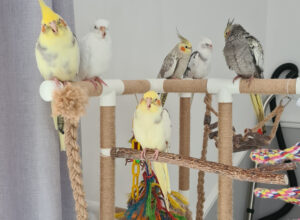Safe Fruits and Vegetables for Cockatiels
- Understanding what fruits and vegetables are safe for cockatiels is essential for their health.
- Regularly incorporating a variety of these foods can contribute to a balanced diet.
- Some fruits and vegetables can be harmful and should be avoided.
- Preparation and serving size matter when introducing new foods to your cockatiel.
As a cockatiel owner with an indoor flock of 6, I’ve spent years observing and learning about the best care practices for these charming birds. Among the most vital aspects of cockatiel care is their diet, which should be both nutritious and varied to ensure their well-being. This article aims to provide fellow cockatiel owners with a guide on safe fruits and vegetables for our feathered friends, drawing on my experience and research.
Cockatiels, like many pet birds, thrive on a diet that goes beyond just seeds or pellets. Introducing a variety of fruits and vegetables into their diet not only mimics their natural foraging behaviour but also supplies them with essential vitamins and minerals. However, not all fruits and vegetables are suitable for cockatiels, and some can even be dangerous. Therefore, it’s crucial to know which foods are beneficial and how to serve them properly.
Safe Fruits and Vegetables
Fruits
Fruits should be a part of your cockatiel’s diet due to their high vitamin content, especially Vitamins A and C, which are vital for your bird’s health. However, fruits should be given in moderation due to their high sugar content. Here are some safe options:
- Apples (without seeds)
- Bananas
- Berries (strawberries, blueberries, raspberries)
- Melons
- Peaches (without the pit)
- Pears (without seeds)
- Plums (without the pit)
Vegetables
Vegetables are arguably even more important than fruits in your cockatiel’s diet, offering a wide range of essential nutrients with less sugar. Include a variety of the following:
- Broccoli
- Carrots (both raw and cooked)
- Leafy greens (kale, spinach, lettuce)
- Peas
- Sweet potatoes (cooked)
- Squash (cooked)
- Courgette
Foods to Avoid
While many fruits and vegetables are safe for cockatiels, some can be harmful or even toxic. Here’s a brief list of foods to avoid:
- Avocado
- Chocolate
- Onions and Garlic
- Fruit seeds and pits (such as apple seeds and peach pits, which can be toxic)
Serving Suggestions
When introducing new foods to your cockatiel, start with small amounts to monitor for any adverse reactions. Here are a few tips for serving fruits and vegetables:
- Wash thoroughly to remove pesticides.
- Cut into small, manageable pieces.
- Mix with their regular food to encourage them to try new foods.
Importance of Variety
Incorporating a variety of fruits and vegetables into your cockatiel’s diet is crucial for providing a range of nutrients. Regularly rotating the foods you offer can prevent boredom and encourage natural foraging behaviour.
Safe Foods
Safe Fruits for Cockatiels
| Fruit | Notes |
|---|---|
| Apples | Remove seeds before serving. |
| Bananas | Peel before serving. |
| Berries | Wash thoroughly. |
| Melons | Remove seeds; serve in small pieces. |
| Peaches | Remove the pit; serve in moderation. |
| Pears | Remove seeds; serve in small pieces. |
| Plums | Remove the pit; serve in moderation. |
Safe Vegetables for Cockatiels
| Vegetable | Preparation |
|---|---|
| Broccoli | Wash thoroughly. |
| Carrots | Serve raw or cooked; chop finely. |
| Leafy Greens | Wash thoroughly; chop finely. |
| Peas | Fresh or frozen; thawed. |
| Sweet Potatoes | Cook thoroughly; mash or chop. |
| Squash | Cook thoroughly; chop finely. |
| Courgette | Wash and serve raw or cooked. |
Conclusion
Caring for cockatiels involves more than just providing shelter and affection; their dietary needs are complex and require thoughtful consideration. By incorporating a variety of safe fruits and vegetables into their diet, you can ensure your feathered friend enjoys both the nutritional benefits and the pleasure of taste and texture variety. Remember to introduce new foods gradually and in moderation, and always keep an eye out for any signs of digestive distress.
For further insights into cockatiel care, including essential care basics, setting up their cage, understanding their behaviour, and ensuring they receive proper veterinary care.
Lastly, never hesitate to consult with a vet if you have any concerns about your cockatiel’s health or diet. Your vigilance and care can make all the difference in your bird’s quality of life.

